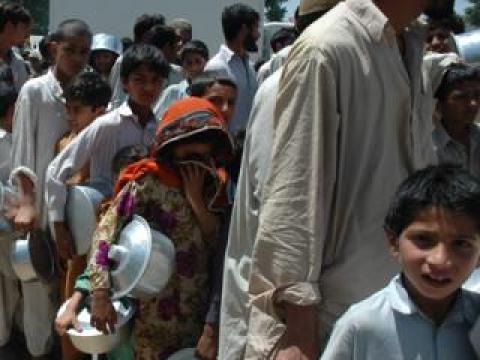Pakistanis continue to flee violence; government and aid agencies respond

“We are seeing new waves of refugees fleeing their homes and arriving in the camps and other temporary shelters each day. In order to bring quick, effective relief to the people of Pakistan, we are working in coordination with the UN, other aid agencies, and the Pakistani government to provide aid to those who need it most,” said Graham Strong, World Vision\'s National Director in Pakistan. “Right now, we must continue to stay focused on our first priority - helping the people of the Swat valley.”
There is human suffering on a massive scale, and it\'s getting worse Earlier today, a UN coordination meeting was held with international aid agencies like World Vision, representatives from Pakistan\'s National Disaster Management Agency (NDMA), and other local partners. Right now, the biggest concerns remain the searing heat that makes life in the tents uncomfortable, the potential for overcrowding within the camps, and the growing daily strain on “host communities”. Host communities are friends, relatives, guest houses, and other government shelters that are set up in the communities around the camps to help absorb the influx of new refugees every day.
Preliminary reports from the field have found that between 70 and 80 percent of the displaced people are living in these host communities, putting an even greater strain on families that are already living in poverty and have very little capacity to provide for their rapidly growing households. There is a desperate need to provide assistance to those living in host communities so that people don\'t begin to compete for scarce resources or move to already crowded camps.
The camps are well organised, but there\'s no comfort in a refugee camp "There is human suffering on a massive scale, and it\'s getting worse. Even with the well-functioning camps and their present effective management and coordination, a rapid movement of even more displaced people could lead to challenges," said Jeff Hall, World Vision’s deputy director for advocacy in the Middle East, Eastern Europe and Central Asia. "The camps are well organised, but there\'s no comfort in a refugee camp."
Men, women, and children are still arriving every day in the camps, and more are expected to come as the conflict unfolds. World Vision has finished its preliminary assessments from the Jalala camp in Mardan and the Chota Lahore camp in Swabi and is preparing to ramp up its relief and response efforts. The aid agency has set up a temporary office in Peshawar, the provincial capital of the Northwest Frontier Province, in order to be closer to the camps and respond quickly. The farthest camp is about one hour\'s drive from Peshawar. Later this week, World Vision will begin distributing non-food items such as pots, pans and cooking supplies to families in need in both the camps and the host communities.
To make a donation to World Vision\'s relief work in Pakistan, go to www.worldvision.org.